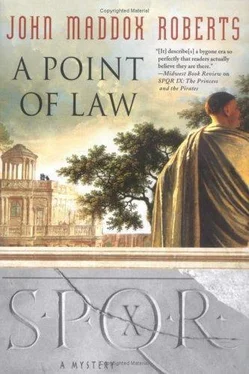John Roberts - A Point of Law
Здесь есть возможность читать онлайн «John Roberts - A Point of Law» весь текст электронной книги совершенно бесплатно (целиком полную версию без сокращений). В некоторых случаях можно слушать аудио, скачать через торрент в формате fb2 и присутствует краткое содержание. Год выпуска: 0101, ISBN: 0101, Издательство: St. Martin, Жанр: Исторический детектив, на английском языке. Описание произведения, (предисловие) а так же отзывы посетителей доступны на портале библиотеки ЛибКат.
- Название:A Point of Law
- Автор:
- Издательство:St. Martin
- Жанр:
- Год:0101
- ISBN:9780312337254
- Рейтинг книги:5 / 5. Голосов: 1
-
Избранное:Добавить в избранное
- Отзывы:
-
Ваша оценка:
- 100
- 1
- 2
- 3
- 4
- 5
A Point of Law: краткое содержание, описание и аннотация
Предлагаем к чтению аннотацию, описание, краткое содержание или предисловие (зависит от того, что написал сам автор книги «A Point of Law»). Если вы не нашли необходимую информацию о книге — напишите в комментариях, мы постараемся отыскать её.
A Point of Law — читать онлайн бесплатно полную книгу (весь текст) целиком
Ниже представлен текст книги, разбитый по страницам. Система сохранения места последней прочитанной страницы, позволяет с удобством читать онлайн бесплатно книгу «A Point of Law», без необходимости каждый раз заново искать на чём Вы остановились. Поставьте закладку, и сможете в любой момент перейти на страницу, на которой закончили чтение.
Интервал:
Закладка:
“Besides, Princess Cleopatra recently spoke of you in the most glowing terms. She said her adventures with you on Cyprus were wonderfully exhilarating.”
“Life always seems to be exhilarating around young Cleopatra,” I told her. “She has a way of attracting excitement.”
“And Ione, the high priestess of the Temple of Aphrodite at Paphos, wrote to me of you. She said that you are the most gifted Roman to come to Cyprus. She believes you to be touched by the gods.”
This was getting embarrassing. “I’m just another Roman drudge, trying to do my duty and dodge the odd assassin,” I told her.
“Please join our little group,” she said. “I believe you must know most of these people.”
She introduced them anyway, then Asklepiodes and I took our seats while their discussion continued. Courtesy dictated that I wait until their evening’s conversation was concluded before I took my problem to her.
Catullus nudged me in the ribs and said in a stage whisper, “Touched by the gods, eh? Bacchus, I’ll bet.”
“Venus,” I muttered back at him. “Princesses and priestesses find me irresistible.” Some of the others turned and frowned at us.
They talked for a long time on some points of philosophy that I couldn’t follow, then about the poetry of Pindar, with which I was at least familiar. I kept my mouth shut rather than stress my ignorance.
I must confess that I felt absurdly flattered that this woman knew who I was, had spoken with Cleopatra, and corresponded with Ione about me. Even better, she had not once mentioned my connection to Caesar. By that time I was beginning to feel that, in most peoples’ eyes, being married to Caesar’s niece was the highest distinction I had achieved.
I was struck by the foolishness of my feelings. Why should I, a widely experienced soldier and magistrate of the greatest republic in the world, feel warmed by the esteem of a foreign woman? After all, she was only a woman. And while we Romans had a grudging admiration, even awe, of the Greeks of former times; we regarded their descendants, our contemporaries, as a pack of foolish degenerates, political imbeciles, and natural-born slaves. We often marveled that the Greeks we saw every day could be even distantly related to Achilles and Agamemnon, or even to the later ones like Pericles, Leonidas, and Miltiades.
Perhaps the truth was that I had grown tired and disillusioned with the Romans of my own class, self-seeking politicians and grasping conquerors who were slowly destroying the Republic more surely than any barbarian enemy could hope to.
Not that I expected to find some cure for our ills in the supposed wisdom of aliens. Many of the more idle and empty-headed members of the senatorial and equestrian orders were forever discovering the answers to the problems that have plagued mankind in the ancient “enlightenment” of Persia or Babylonia or Egypt. They never explain how this wonderful wisdom failed to save those utterly fallen and destroyed civilizations. At least men like Brutus and Cicero chose to admire the relatively rational Greeks, who knew how to carve wonderful statues.
Eventually, people began to rise and take their leave. While Callista bade each good night I spoke briefly with Brutus. He was a man of the highest reputation but far too solemn and serious for my taste. He couldn’t decide which direction to spit without wondering how it might reflect on the honor of his ancient family. I thought it a grotesque fixation in one so young. His mother, Servilia, had been one of the great beauties of her generation, and Brutus had inherited some portion of her comeliness, which did not otherwise run in his aptly named family.
“I hope this decision of the comitia tributa goes well for you, Senator,” Brutus said gravely. He gave the word for the plebeian assembly the slightly contemptuous turn common to patricians. They always preferred the comitia centuriata , which was dominated by a handful of great families.
“I daresay their decision will be enlightening,” I told him. “This whole business has me utterly mystified. It’s true I was a bit rough on certain Romans living in Cyprus, but they were all thieves and plunderers and I can prove it. How this fool Fulvius got killed I have no idea.”
“All honest Romans agree that your actions on Cyprus were perfectly just,” Brutus said ponderously. “Cato concurs with me on this. The death of this man Fulvius, while unfortunate, is a trifling matter compared with the great dangers before us. Did you know that an invading army is about to descend upon Rome?”
“Really?” I said, doubting his sanity. “Not the Parthians, I hope.”
“I almost wish it were. Caesar has given half his legions leave of absence so that they can come to Rome and take part in the election. A rider came in not three hours ago to inform the aediles that the first cohorts would be pitching their tents on the Campus Martius in the morning. The rest will be here within two days.”
“That’s high-handed behavior even for Caesar,” I said. “But as far as I know, it’s constitutional. And he can spare them. It’s the depth of winter up in Gaul. He can keep his conquests in order with his auxilia.” The auxilia were foreigners, allies, and mercenaries. Legionaries, on the other hand, were all citizens, which meant they could all vote. And they would vote for Caesar’s favored candidates.
“It’s good news for you, I suppose,” Brutus grumbled. I was one of those favored candidates.
“I won’t be a total hypocrite and claim I don’t want their votes,” I admitted. “But any army descending on Rome, even a Roman one, is an unsettling concept.”
“I rejoice to hear it. But the time must come when men who love the Republic must take action to curb the arrogance of Caesar.”
I won’t pretend to be an oracle and claim that in these words I perceived a portent of dire deeds to come. Nor did I foresee a bloody Ides of March when I heard Cassius, Casca, Basileus, and all the rest voice similar thoughts in that and future years, all those men who are now so notorious. Half of Rome, it seemed, spoke darkly of the other half, and many important figures jumped nimbly from one side to the other, repeatedly, not least among them the men who later plotted Caesar’s death.
Finally only Asklepiodes and I remained of the evening’s guests.
“Callista,” Asklepiodes said, “my friend the Senator Metellus has a singular problem, its solution requires a combination of skills and talents that I have informed him are possessed in abundance by you alone of all the scholars now resident in Rome.” He spoke in Greek, which I could follow well enough.
“How intriguing. I shall seek to vindicate your trust in me.” She turned to me and switched to Latin. “And how may I possibly be of help?”
I took out the papers. “These documents were written in cipher by a person whose activities I am investigating. The alphabet used is Greek, although I can’t say whether the language thus encoded is Greek or Latin.” I handed them to her, and she studied them by the light of a multiwicked lamp.
“Are you certain that it is one of those two languages? I ask because of the extraordinary repetition of the letter delta. The arrangement, even taking into account the common letter substitution of ciphers, doesn’t look like either language.”
This could mean trouble. “The man in question lived almost all his life in Baiae, which is in Campania. It’s conceivable that it’s the Oscan dialect that is used. But Oscan has almost the same grammar as Latin, though the vocabulary and pronunciation are different.”
She shook her head. “Then that can’t be it. Do you know to whom this is written?”
“I have no idea.”
Читать дальшеИнтервал:
Закладка:
Похожие книги на «A Point of Law»
Представляем Вашему вниманию похожие книги на «A Point of Law» списком для выбора. Мы отобрали схожую по названию и смыслу литературу в надежде предоставить читателям больше вариантов отыскать новые, интересные, ещё непрочитанные произведения.
Обсуждение, отзывы о книге «A Point of Law» и просто собственные мнения читателей. Оставьте ваши комментарии, напишите, что Вы думаете о произведении, его смысле или главных героях. Укажите что конкретно понравилось, а что нет, и почему Вы так считаете.









